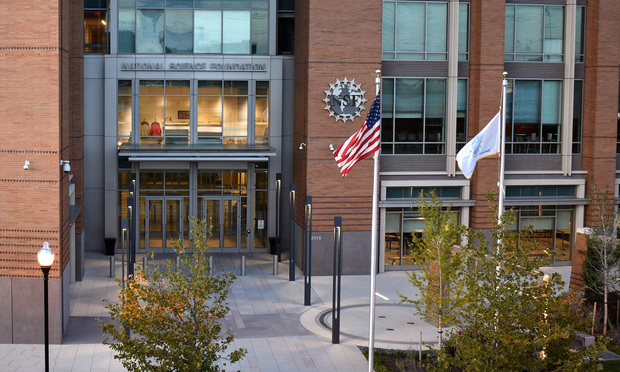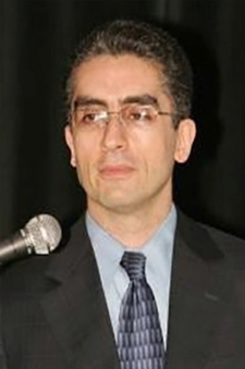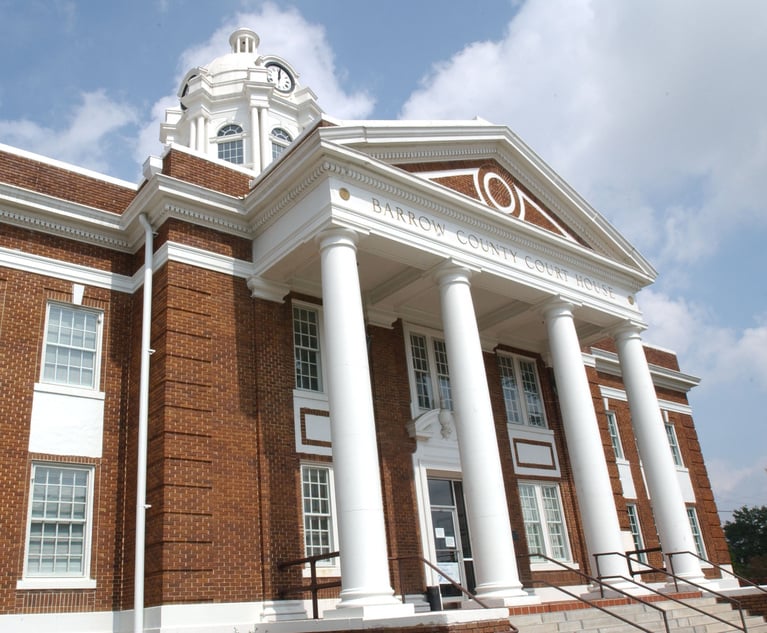Ga. Tech Professor Sentenced for Defrauding National Science Foundation
A formerly tenured professor with GA Tech's School of Electrical and Computer Engineering was sentenced for making false statements or omissions when submitting electronic payment requests.
November 05, 2019 at 04:20 PM
4 minute read
 National Science Foundation headquarters in Alexandria, Virginia. (Photo: ShutterFlash/Shutterstock.com)
National Science Foundation headquarters in Alexandria, Virginia. (Photo: ShutterFlash/Shutterstock.com)
A former Georgia Tech professor honored for his work by President George W. Bush has been sentenced to home confinement and ordered to pay restitution for his role in a scheme to defraud the National Science Foundation, the U.S. attorney in Atlanta announced Tuesday.
 Maysam Ghovanloo.
Maysam Ghovanloo.Maysam Ghovanloo, 46, of Atlanta—who resigned as a tenured professor at Georgia Tech's School of Electrical and Computer Engineering last June—will serve eight months of home confinement and pay $40,000 in restitution after pleading guilty in August to wire fraud, U.S. Attorney Byung J. "BJay" Pak said.
"Grant funding is limited, and the competition for those dollars is keen," Pak said in announcing the sentence. "People awarded grants to do research and development vow that they will adhere to the rules governing it. Ghovanloo decided to sacrifice his reputation by dodging those rules and lying."
Ghovanloo is also barred for three years from doing business with the government, Pak said.
Judge Steve Jones of the U.S. District Court for the Northern District of Georgia sentenced Ghovanloo after he pleaded guilty to one count of wire fraud in August.
Ghovanloo owned and operated Bionic Sciences, which received federal grants through the National Science Foundation's Small Business Innovation Research program, according to prosecutors and court records. The program provides small businesses with funding for research that will lead to the commercialization of new products and services.
But according to the U.S. attorney, Ghovanloo and his company made "materially false and fraudulent statements" or omissions in submitting electronic payment requests to the National Science Foundation.
Chief among the false statements was Ghovanloo's failure to notify the National Science Foundation that his collaborator in a project was no longer involved, and his assertion that the project had been completed successfully and was eligible for a followup grant, according to a sentencing memorandum.
Ghovanloo's attorney, Craig Gillen of Atlanta's Gillen, Withers & Lake, couldn't be reached for comment. But Gillen argued in a sentencing memorandum that, while what Ghovanloo did was wrong, "Unlike most federal funding fraud cases, the work product generated by the grant funds was excellent" and received followup funding because it "was so outstanding."
Ghovanloo was honored at the White House at a reception in 2008 recognizing outstanding members of the Muslim community. Bush specifically praised the professor for his work in biomedical engineering and singled out his tongue drive system, according to a sentencing memorandum. That system enables people with severe physical disabilities to use tongue motion to access computers, smartphones and drive their wheelchairs.
Gillen said that Ghovanloo's achievements in designing technology to aid people with significant disabilities does not "explain away the seriousness of the federal violation" to which Ghovanloo pleaded guilty. "It is to explain that, although Dr. Ghovanloo did commit the charged offense, his work was not a fraud but rather an excellent endeavor to help many people with physical disabilities."
"Moreover," Gillen added, "Dr. Ghovanloo's work was not about personal enrichment. In most federal programs fraud cases, the defendants defraud the government by submitting false or inflated invoices for little or no work to scam the government and enrich themselves. This is not the case here. … During some months, while others were paid for their monthly work, Dr. Ghovanloo would receive less money than others in the projects and even, for some months, he paid himself nothing at all."
This content has been archived. It is available through our partners, LexisNexis® and Bloomberg Law.
To view this content, please continue to their sites.
Not a Lexis Subscriber?
Subscribe Now
Not a Bloomberg Law Subscriber?
Subscribe Now
NOT FOR REPRINT
© 2025 ALM Global, LLC, All Rights Reserved. Request academic re-use from www.copyright.com. All other uses, submit a request to [email protected]. For more information visit Asset & Logo Licensing.
You Might Like
View All
From 'Confusing Labyrinth' to Speeding 'Roller Coaster': Uncertainty Reigns in Title IX as Litigators Await Second Trump Admin
6 minute read
University of Georgia School of Law Finds Next Dean on Its Own Faculty
3 minute read
Teen Charged in Barrow School Shooting and His Father to Stay in Custody After Hearings
5 minute readTrending Stories
- 1'Headaches,' Opportunities Ahead for Lawyers Advising Foreign Businesses, Attorneys Say
- 2'There's Always More to Be Done': Former US Attorney Breon Peace Reflects on Series of Firsts at EDNY
- 3Former Thomas Clerk Sarah Harris to Serve as Acting Solicitor General
- 4Coral Gables Firm Secures $26M Settlement
- 5Trump's Second Term Spurs Unusual Alliances Between US and European Law Firms
Who Got The Work
J. Brugh Lower of Gibbons has entered an appearance for industrial equipment supplier Devco Corporation in a pending trademark infringement lawsuit. The suit, accusing the defendant of selling knock-off Graco products, was filed Dec. 18 in New Jersey District Court by Rivkin Radler on behalf of Graco Inc. and Graco Minnesota. The case, assigned to U.S. District Judge Zahid N. Quraishi, is 3:24-cv-11294, Graco Inc. et al v. Devco Corporation.
Who Got The Work
Rebecca Maller-Stein and Kent A. Yalowitz of Arnold & Porter Kaye Scholer have entered their appearances for Hanaco Venture Capital and its executives, Lior Prosor and David Frankel, in a pending securities lawsuit. The action, filed on Dec. 24 in New York Southern District Court by Zell, Aron & Co. on behalf of Goldeneye Advisors, accuses the defendants of negligently and fraudulently managing the plaintiff's $1 million investment. The case, assigned to U.S. District Judge Vernon S. Broderick, is 1:24-cv-09918, Goldeneye Advisors, LLC v. Hanaco Venture Capital, Ltd. et al.
Who Got The Work
Attorneys from A&O Shearman has stepped in as defense counsel for Toronto-Dominion Bank and other defendants in a pending securities class action. The suit, filed Dec. 11 in New York Southern District Court by Bleichmar Fonti & Auld, accuses the defendants of concealing the bank's 'pervasive' deficiencies in regards to its compliance with the Bank Secrecy Act and the quality of its anti-money laundering controls. The case, assigned to U.S. District Judge Arun Subramanian, is 1:24-cv-09445, Gonzalez v. The Toronto-Dominion Bank et al.
Who Got The Work
Crown Castle International, a Pennsylvania company providing shared communications infrastructure, has turned to Luke D. Wolf of Gordon Rees Scully Mansukhani to fend off a pending breach-of-contract lawsuit. The court action, filed Nov. 25 in Michigan Eastern District Court by Hooper Hathaway PC on behalf of The Town Residences LLC, accuses Crown Castle of failing to transfer approximately $30,000 in utility payments from T-Mobile in breach of a roof-top lease and assignment agreement. The case, assigned to U.S. District Judge Susan K. Declercq, is 2:24-cv-13131, The Town Residences LLC v. T-Mobile US, Inc. et al.
Who Got The Work
Wilfred P. Coronato and Daniel M. Schwartz of McCarter & English have stepped in as defense counsel to Electrolux Home Products Inc. in a pending product liability lawsuit. The court action, filed Nov. 26 in New York Eastern District Court by Poulos Lopiccolo PC and Nagel Rice LLP on behalf of David Stern, alleges that the defendant's refrigerators’ drawers and shelving repeatedly break and fall apart within months after purchase. The case, assigned to U.S. District Judge Joan M. Azrack, is 2:24-cv-08204, Stern v. Electrolux Home Products, Inc.
Featured Firms
Law Offices of Gary Martin Hays & Associates, P.C.
(470) 294-1674
Law Offices of Mark E. Salomone
(857) 444-6468
Smith & Hassler
(713) 739-1250







